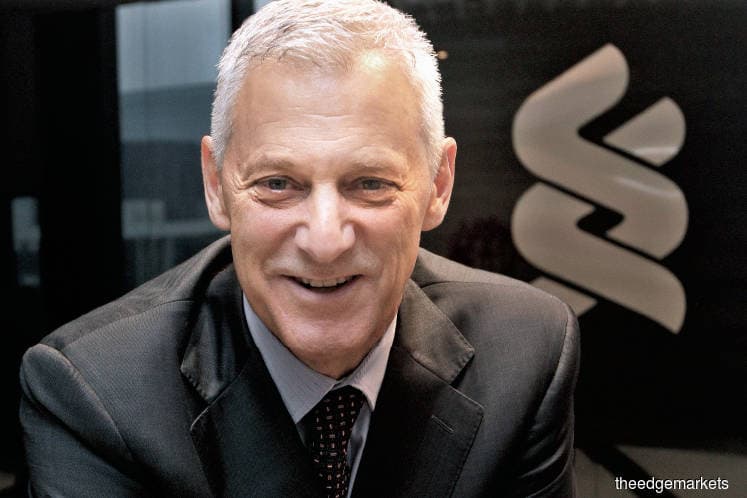
This article first appeared in The Edge Malaysia Weekly on December 2, 2019 - December 8, 2019
IT may surprise many to know that Bill Winters, head honcho at Standard Chartered PLC, had never set out to be a banker.
“I thought I was going to be a diplomat,” the 58-year-old career banker tells The Edge with a grin on his face.
The American chief executive of the London-based banking group reveals how he had studied international relations and history at university, and then applied to do his master’s in international diplomacy.
“But then, I realised I had to get the tuition money [for that]. So, I took a job at JP Morgan to see if I could save up for a couple of years before getting my master’s. Then the bug bit me and I realised I quite enjoyed banking. So I stuck with it. I was with JP Morgan for 26 years,” he explains.
Warm and affable, often witty, Winters, who was born in Connecticut, would likely have made a splendid diplomat. Instead, he went on to excel in his unintended field.
At JP Morgan, Winters climbed the ladder to become the co-CEO of the investment bank, from 2004 until he stepped down in 2009.
He played a big role in helping reform the UK banking sector after the 2008/09 global financial crisis (GFC). Winters was one of the committee members of the Independent Commission of Banking that was set up in 2010 to recommend ways to improve competition and financial stability in banking.
Later, he served as an adviser to the Parliamentary Commission on Banking Standards and was asked by the Bank of England to complete an independent review of its liquidity operations.
Winters was appointed to his current role at StanChart in June 2015. To take the position, he had to sell Renshaw Bay, an asset management firm he had founded and run.
When asked what he has enjoyed doing the most in all his banking-related endeavours, he says, “It sounds like a cliché but I have enjoyed all of it. I think probably the biggest fear that I have in life is the fear of being bored. I have been very lucky because I’ve had opportunities to try different things.”
He says he has had plenty of memorable moments over the years but the one that sticks out is of the GFC. “When I’m older and even greyer and reflecting on my professional life — from a rocking chair some place or a hospital bed or whatever — inevitably, the 2008/09 financial crisis will feature prominently.”
He was at JP Morgan at the time.
“At JP Morgan, we didn’t imagine that the crisis could end up looking like anything it did but we were prepared for a bad time. As a result, we were able to be part of the resolution of the crisis rather than contributing to it. We actually did very well during the crisis. But it was extremely dramatic. First, when we had to take over Bear Stearns when it failed, and then helping resolve things during the Lehman [Brothers] bankruptcy,” Winters recalls.
“It was an extraordinary experience and I don’t know whether I could say it was a good or a bad one. It was kind of the best and the worst [experience], wrapped into one. The best because we felt that we were doing something quite useful and good in terms of helping resolve things; and the worst because we saw the pain all around us, some of which we experienced ourselves.”
Winters takes pride in the fact that he managed to deliver on a plan to turn around StanChart. The bank, which reported a pre-tax loss of US$1.5 billion in 2015, its first annual loss since 1989, looks en route to reporting its fourth straight year of underlying profit this year.
“When we launched our [turnaround] strategy in 2015, I think most people said ‘yeah, it makes sense’ but many also said ‘no, we don’t think StanChart can do it as it’s too difficult, the problems are too big’. But we had confidence. To be able to say three, four years later, ‘well, we’re doing it’, I take great satisfaction from that.”
Interestingly, Winters and group chief financial officer Andy Halford last month announced that they would take pay cuts following shareholder concern over their remuneration.
Does Winters see himself being at the bank for much longer?
“You never know. I’ve enjoyed everything I’ve done, and I love this. So, how much longer this lasts is going to be up to our board of directors and all that.”
Winters, who is married with two grown children, lives in London but travels frequently to Asia, from where StanChart derives most of its profits. Despite his busy schedule, he finds time to indulge in his passion for theatre.
“My wife runs a theatre in London and it has become quite an operation actually. I spend a lot of my non-StanChart time in or around that theatre,” he says.
Read also:
Save by subscribing to us for your print and/or digital copy.
P/S: The Edge is also available on Apple's AppStore and Androids' Google Play.